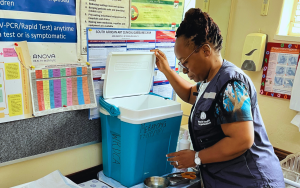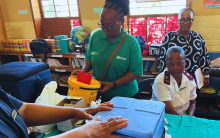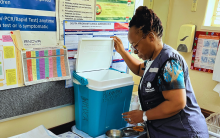WHO South Africa supported the Measles Vaccination Campaign as a Public Health Response to a measles outbreak in South Africa
In a concerted effort to combat the outbreak of measles and bolster the ongoing measles elimination phase, the National Department of Health in South Africa, in collaboration with the World Health Organization (WHO) South Africa and other partners, concluded a measles vaccination campaign. The campaign, which ran from February 6th to April 30th, targeting children between the ages of 6 months to 15 years, aiming to achieve a coverage of at least 95%.
The backdrop of the COVID-19 pandemic disrupted routine immunizations, resulting in a coverage drop below the target of 95%, with some provinces falling to less than 80%. The risk of a national measles outbreak loomed largely due to low immunization coverage, inadequate surveillance, and a surge in positive cases.
WHO South Africa, working in tandem with the National Department of Health, took proactive measures to address this concern. The initial plan was to conduct an integrated measles campaign to close the widening immunity gap among children 6 – 59 months but due to confirmed outbreaks in various provinces which mainly affected children above 5 years, the scope of the campaign was expanded to cover children up to 15 years, and the duration extended to 30 April.
The campaign integrated multiple interventions, including vitamin A supplementation for children between 6-59 months and deworming tablets for those aged 12-59 months. The collaborative effort focused on aligning with global strategies for measles elimination, receiving unwavering support from WHO.
Key Achievements:
- High Government Commitment: The government demonstrated unwavering commitment, procuring 100% of vaccines and ancillaries required for the campaign.
- Technical and Financial Support: WHO, along with WHO Africa Region (regional office), WHO South Africa and UNICEF South Africa, provided crucial technical and financial support covering operational costs, training, printing, and supervision.
- Integration of Interventions: The campaign successfully integrated measles vaccination with other essential interventions, showcasing a holistic approach to public health.
- Collaboration Across Sectors: Collaboration between the Department of Basic Education, schools, crèches, districts, subdistricts, and health facilities played a pivotal role in ensuring widespread vaccination coverage, particularly among students.
- Dedication of Healthcare Workers: Despite challenging circumstances on the ground, healthcare workers showed remarkable dedication and commitment throughout the campaign.
Challenges Faced:
- Lack of Oversight Committees: The absence of national and subnational committees for overseeing various campaign components posed a challenge.
- Incomplete Microplans: Insufficient microplans at all levels led to inadequate coverage in hard-to-reach areas, necessitating improved planning for future campaigns.
- Resource Shortages: Shortages of necessary resources were identified as a hurdle for the campaign's optimal implementation.
- Data Discrepancies: Discrepancies in data collection and recording highlighted the need for a more accurate and streamlined data management system.
- Identification Challenges: The absence of indelible markers for vaccinated children posed challenges in identifying and reaching unvaccinated children during catch-up efforts.
Lessons Learned:
- Continued Follow-up Campaigns: The accumulation of zero-dose children and primary vaccine failures underscored the need for periodic follow-up campaigns every 3-4 years.
- Importance of Collaboration: Strong collaboration between stakeholders, including government bodies and international organizations, proved essential for the campaign's success.
- Preparedness is Key: Adequate time for logistical preparation and readiness, including social mobilization, emerged as a critical factor in ensuring the effectiveness of vaccination campaigns.
Although the numeric target for the campaign was not reached, the measles vaccination campaign in South Africa successfully halted the ongoing measles outbreak and this stands as a testament to the power of collaboration, dedication, and strategic planning. As the nation moves forward, the lessons learned will undoubtedly contribute to strengthening routine immunization efforts and ensuring the sustainability of public health initiatives. WHO South Africa remains committed to working collaboratively with national partners to build a healthier, more resilient future for all.


